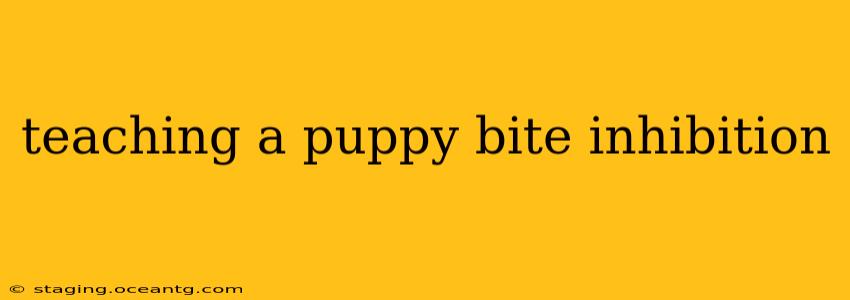Teaching bite inhibition is crucial for raising a well-behaved and safe dog. Puppies, naturally, explore the world through their mouths. Understanding this and implementing consistent training methods will ensure your puppy learns to control their bite force and avoid causing harm. This guide covers everything from understanding the reasons behind puppy biting to advanced techniques for managing this common puppy behavior.
Why Do Puppies Bite?
Puppies bite for several reasons, and understanding these reasons is the first step to effective training.
- Exploration: Puppies use their mouths to explore their environment, much like babies. Everything goes in their mouths – toys, hands, feet, and other dogs.
- Teething: The discomfort of teething can lead to increased biting as puppies seek relief.
- Excitement/Play: Overexcited puppies may bite during play, unaware of their own strength.
- Fear/Anxiety: A frightened or anxious puppy might bite as a defensive mechanism.
- Lack of Socialization: Puppies lacking proper socialization may not learn appropriate bite inhibition from other dogs.
How to Stop a Puppy From Biting: Effective Strategies
There's no single magic bullet, but consistent application of these strategies will significantly reduce biting behavior.
1. High-Value Rewards & Positive Reinforcement
Positive reinforcement is key. When your puppy bites too hard, immediately stop playing, and remove yourself or your hand from their reach. After a brief pause, resume gentle play only when the puppy demonstrates calm behavior. Reward good behavior with high-value treats or praise. The goal is to associate gentle interactions with positive reinforcement.
2. The "Ouch!" Method
When your puppy nips, immediately say a firm but gentle "ouch!" This simulates the pain they would inflict on another dog. Then, ignore them for a short time. This teaches them that biting leads to a negative consequence (loss of attention).
3. Puppy Play with Other Dogs
Supervised play with appropriately socialized and similarly-sized puppies can help your puppy learn bite inhibition naturally. Observe the interactions carefully; intervene only if necessary. Remember, this method works best with puppies who already have some basic bite inhibition training.
Frequently Asked Questions (PAA)
Many owners grapple with specific scenarios. Let's address some common questions:
What if my puppy bites very hard?
If your puppy bites hard enough to cause damage, it’s crucial to address the behavior immediately. Use the methods described above more rigorously and consider consulting a certified professional dog trainer or veterinary behaviorist. Hard biting can be indicative of a deeper issue requiring professional guidance.
How long does it take to stop a puppy from biting?
There's no set timeline. Consistency is key. It takes time and patience, but with dedicated effort, you'll see improvement. Some puppies learn quickly, while others require more time and repetition.
My puppy bites only when excited. What should I do?
Excitement biting is common. Before playtime, tire your puppy out with a walk or some other form of exercise. Manage their arousal level by keeping play sessions short and ending them before the puppy gets overly excited. Teach your puppy a "leave it" or "drop it" command to manage their mouthiness.
Is it okay to use a "time-out" for biting?
A short, supervised time-out in a calm, quiet location can be effective, but it should be combined with positive reinforcement methods. The time-out should not be used as punishment but as a way to interrupt unwanted behavior and provide a brief period of calm before re-engaging with the puppy.
Conclusion
Teaching bite inhibition is a journey, not a race. With patience, consistency, and the right approach, you can guide your puppy towards becoming a gentle and well-behaved companion. Remember, always prioritize positive reinforcement and never resort to punishment, which can damage your relationship with your puppy and potentially make the problem worse. If you are struggling, don't hesitate to seek professional guidance from a certified dog trainer or veterinary behaviorist. They can offer personalized strategies and support.
